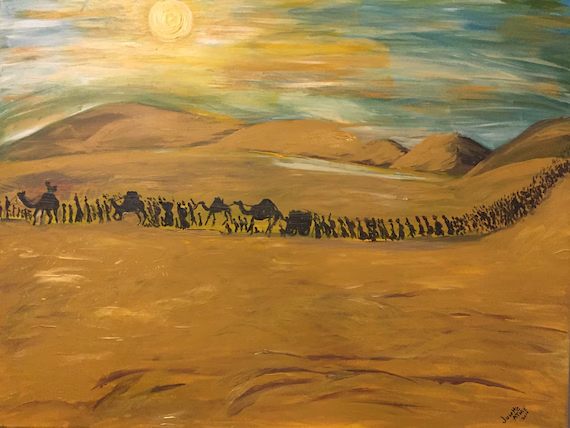Home to Jerusalem
Cyrus, who ruled Persia from his palace in Babylon, was a good king.
He put out a proclamation, saying; 'The Lord God of Israel has told me to build a house for Him in Jerusalem.
All his people are free to go home to rebuild the Temple that Solomon built, I will 'retum all the treasures that King Nebuchadnezzar stole, from the Temple before he destroyed it.
The Israelites, or Jews, as they were also known, were overjoyed that they were free to go home at last, In all, forty-two thousand people prepared for the journey across the desert.
They took with them their servants, and horses, mules and camels, all loaded with goods and food.
When they reached Jerusalem, they began work to rebuild the Temple at once. Many people gave gifts of gold and silver to pay for the stonemasons and carpenters, and provided them with food.
First the workman laid the foundations of the Temple. When they were finished, the priests sang songs of thanks and praises to God.
The people who had been living in Judah while the Jews were in exile in Babylon offered to help with the building work.
But the Jews refused: they wanted to do it all themselves. This led to trouble with the people living there, and work on the Temple stopped for a long time.
Instead, the Jews worked on their houses until some of God's prophets made them feel ashamed.
"God's house is in ruins while you work on your own houses." they said.
So the Jews 'retumed to work on the Temple, until it was finished. It was not as impressive as the great Temple built by King Solomon, but it was a very splendid building.
The priests held the Feast of the Passover there, and the people celebrated with great joy, giving thanks to God.
The years passed, and the Jews lived peacefully in Jerusalem. Back in Babylon was a scholar. Named Ezra, who had stayed in Persia.
He studied the Laws given by God to Moses, and he felt that the Jews in Israel didn't know God's Laws. He went to the King and asked for permission to go to Jerusalem to teach the people there.
'You may go, said the King, and anyone who wants to may go with you. I'll give you gold and silver, and other things you need for the Temple of God.
So Ezra left Babylon with many of the other Jews who had stayed in the city. The journey was long and dangerous, but God kept them from harm, as Ezra knew He would, and they reached Jerusalem safely.
There Ezra found that not all the people were keeping to God's Laws. Some of the Jewish men had married foreign wives who had brought their own gods with them.
This was what had led to the destruction of Jerusalem, when the people were taken into exile, all those years ago.
Ezra called all the people in Judah to come to Jerusalem in three days' time. When they had gathered in front of the Temple, he said. 'You have broken your promises to God.
Then he taught them God's Laws and how they should.
The Israelites, knew that King Solomon's wisdom came from God.













Comments
Post a Comment